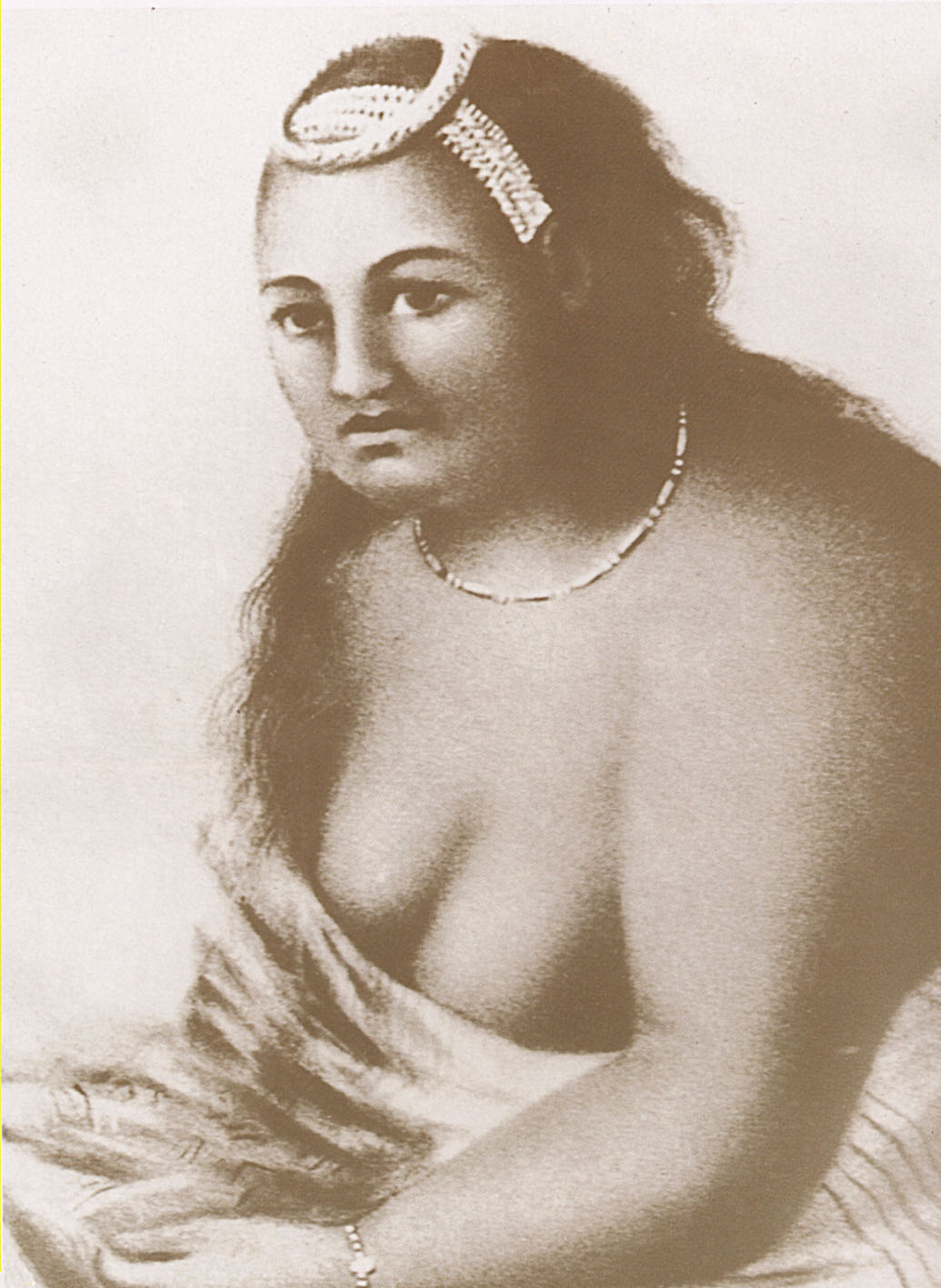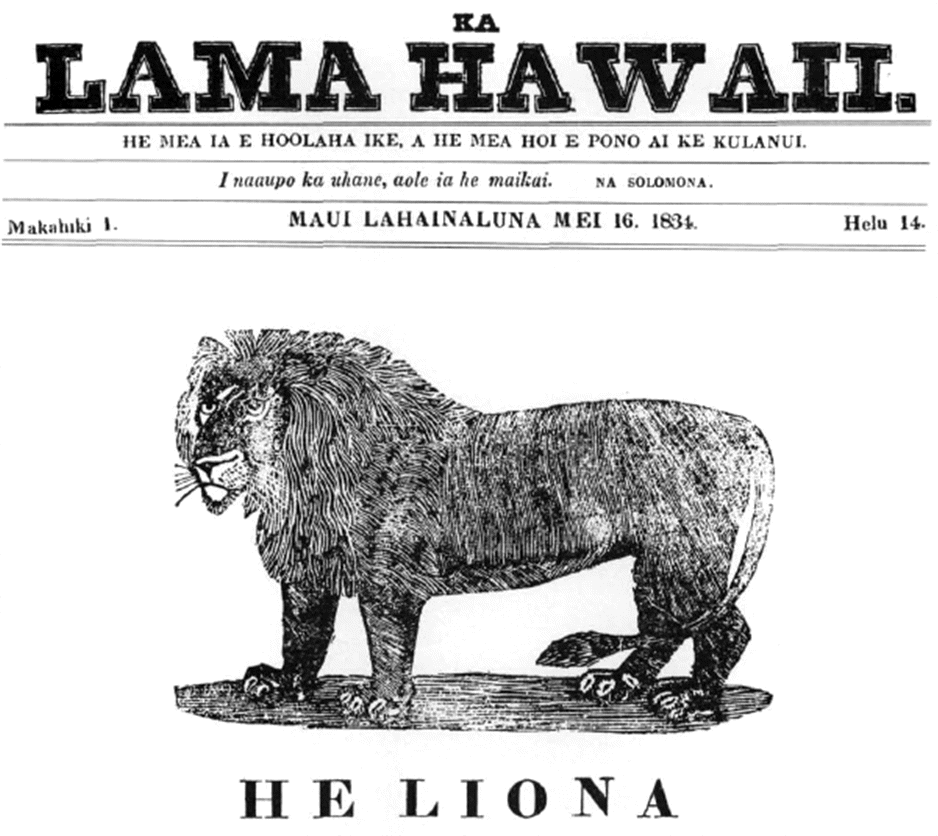|
Kekūanaōʻa
Mataio Kekūanaōʻa ( – November 24, 1868), formally referred to as His Honor or His Highness, was a Hawaiian politician who served as governor of the island of Oʻahu, father of two kings, Kamehameha IV and Kamehameha V, and held the office of Kuhina Nui as did his wife, Kīnaʻu and their daughter, Victoria Kamāmalu. Parentage and early life His first name Mataio, which he adopted later in life, is the Hawaiian form of Matthew. Kekūanaōʻa translates as "the standing projection" in the Hawaiian language and refers to the masts of Western ships seen in the harbor at his birth. Kekūanaōʻa was born sometime around the year 1791. His mother is believed to be Inaina. While an obituary at his death identified his father as Nāhiʻōleʻa, on March 14, 1879 the Hawaiian Supreme court identified Kiʻilaweau as the father of Kekuanaoa in probate using the genealogy books of the royal family, proving a legal bloodline line from Keʻelikōlani back to Kiʻilaweau's grandmot ... [...More Info...] [...Related Items...] OR: [Wikipedia] [Google] [Baidu] |
Victoria Kamāmalu
Victoria Kamāmalu Kaʻahumanu IV (November 1, 1838 – May 29, 1866) was ''Kuhina Nui'' of Hawaii and its crown princess. Named Wikolia Kamehamalu Keawenui Kaʻahumanu-a-Kekūanaōʻa and also named Kalehelani Kiheahealani, she was mainly referred to as Victoria Kamāmalu or Kaʻahumanu IV, when addressing her as the ''Kuhina Nui''. In her role of Kuhina Nui, she acted as Regent between the death of the King in 1863 until the election of a new King the same year. Family Born at the Honolulu Fort, on November 1, 1838, she was the only daughter of Elizabeth Kīnaʻu (Kaʻahumanu II) and her third husband Mataio Kekūanāoʻa. Through her mother she was granddaughter of King Kamehameha I, founder of the united Hawaiian Kingdom. Her two brothers would later become kings of Hawaii as Kamehameha IV and Kamehameha V. She was named after her maternal aunt Queen Kamāmalu, the consort of Kamehameha II, who died in London from the measles. The Christian name Victoria was after Queen ... [...More Info...] [...Related Items...] OR: [Wikipedia] [Google] [Baidu] |
Kuhina Nui Of The Hawaiian Islands
Kuhina Nui was a powerful office in the Kingdom of Hawaii from 1819 to 1864. It was usually held by a relative of the king and was the rough equivalent of the 19th-century European office of Prime Minister or sometimes Regent. Origin of the office Before the establishment of the office of ''Kuhina Nui'' by Kamehameha, there was a position called Kālaimoku ("kālai" meaning "to carve" and "moku" being an island). This was an ancient office from the very dawn of Hawaiian civilization. During this time before the ''Kuhina Nui'' Kalanimoku, a trusted chief of Kamehameha, was the Kālaimoku until Kamehameha established the office of the ''Kuhina Nui''. When King Kamehameha II assumed the throne in 1819, his father's favorite wife, Queen Kaʻahumanu, told him Kamehameha I had wished for her to rule the kingdom alongside him. Whether this was really the will of Kamehameha I is a matter of debate. In either case, Kamehameha II did not object and the office of ''Kuhina Nui'' was created f ... [...More Info...] [...Related Items...] OR: [Wikipedia] [Google] [Baidu] |
Mark Twain
Samuel Langhorne Clemens (November 30, 1835 – April 21, 1910), known by his pen name Mark Twain, was an American writer, humorist, entrepreneur, publisher, and lecturer. He was praised as the "greatest humorist the United States has produced", and William Faulkner called him "the father of American literature". His novels include ''The Adventures of Tom Sawyer'' (1876) and its sequel, ''Adventures of Huckleberry Finn'' (1884), the latter of which has often been called the " Great American Novel". Twain also wrote ''A Connecticut Yankee in King Arthur's Court'' (1889) and '' Pudd'nhead Wilson'' (1894), and co-wrote The Gilded Age: A Tale of Today (1873) with Charles Dudley Warner. Twain was raised in Hannibal, Missouri, which later provided the setting for ''Tom Sawyer'' and ''Huckleberry Finn''. He served an apprenticeship with a printer and then worked as a typesetter, contributing articles to the newspaper of his older brother Orion Clemens. He later became a river ... [...More Info...] [...Related Items...] OR: [Wikipedia] [Google] [Baidu] |
Legislature Of The Hawaiian Kingdom
The Legislature of the Hawaiian Kingdom () was the bicameral (later unicameral) legislature of the Hawaiian Kingdom. A royal legislature was first provided by the 1840 Constitution and the 1852 Constitution was the first to use the term Legislature of the Hawaiian Islands, and the first to subject the monarch to certain democratic principles. Prior to this the monarchs ruled under a Council of Chiefs (ʻAha Aliʻi). Structure The Legislature from 1840 to 1864 was bicameral and originally consisted of a lower House of Representatives and an upper House of Nobles as provided for under the Constitutions of the Kingdom of 1840 and 1852, until abolished by the 1864 Constitution which then provided for a unicameral Legislature. House of Nobles The members of the upper House of Nobles (Hale ʻAhaʻōlelo Aliʻi) were appointed by the Monarch with the advice of his Privy Council. It also served as the court of impeachment for any royal official. Members were usually Hawaiian ali� ... [...More Info...] [...Related Items...] OR: [Wikipedia] [Google] [Baidu] |
1864 Constitution Of The Hawaiian Kingdom
Events January–March * January 13 – American songwriter Stephen Foster ("Oh! Susanna", "Old Folks at Home") dies aged 37 in New York City, leaving a scrap of paper reading "Dear friends and gentle hearts". His parlor song "Beautiful Dreamer" is published in March. * January 16 – Denmark rejects an Austrian-Prussian ultimatum to repeal the Danish Constitution, which says that Schleswig-Holstein is part of Denmark. * January 21 – New Zealand Wars: The Tauranga campaign begins. * February – John Wisden publishes '' The Cricketer's Almanack for the year 1864'' in England; it will go on to become the major annual cricket reference publication. * February 1 – Danish-Prussian War (Second Schleswig War): 57,000 Austrian and Prussian troops cross the Eider River into Denmark. * February 15 – Heineken brewery founded in Netherlands. * February 17 – American Civil War: The tiny Confederate hand-propelled submarine ''H. L. Hunley'' sin ... [...More Info...] [...Related Items...] OR: [Wikipedia] [Google] [Baidu] |
Governors Of Oahu
The Governor of Oahu ( haw, Kiaaina o Oahu) was the royal governor or viceroy of the island of Oahu in the Kingdom of Hawaii. The Governor of Oahu resided at Honolulu and was usually a Hawaiian chief or prince and could even be a woman. The governor had authority over the island of Oahu and Honolulu, the kingdom's capital, and it was up to the governor to appoint lieutenant governors to assist them. The governor had replaced the old alii aimokus of the islands, but sovereignty remained with the king. The island governors were under the jurisdiction of the Ministers of the Interiors. Either the governor or the monarch had the power to call in foreign assistance in time of troubles. This occurred a few times, including the uprising of the Emmaites in 1874 when John Owen Dominis called for British and American assistance. Neither the governor nor monarch called for foreign assistance in January 1893 when John L. Stevens sent American troops into Honolulu. Role In the 1840 Constit ... [...More Info...] [...Related Items...] OR: [Wikipedia] [Google] [Baidu] |
Mary Kawena Pukui
Mary Abigail Kawenaulaokalaniahiiakaikapoliopele Naleilehuaapele Wiggin Pukui (20 April 1895 – 21 May 1986), known as Kawena, was a Hawaiian scholar, author, composer, hula expert, and educator. Life Pukui was born on April 20, 1895, in her grandmother's home, named Hale Ola, in Haniumalu, Kau, on Hawaii Island, to Henry Nathaniel Wiggin (originally from Salem, Massachusetts, of a distinguished shipping family descended from Massachusetts Bay Colony governor Simon Bradstreet and his wife, the poet Anne Bradstreet) and Mary Paahana Kanakaole, descendant of a long line of kahuna (priests) going back centuries. Pukui's maternal grandmother, Naliipoaimoku, was a ''kahuna laau lapaau'' (medicinal expert) and ''kahuna pale keiki'' (midwife) and a hula dancer in Queen Emma's court. She had delivered the child, and asked Pukui's parents for the child to raise in the traditional way, and her request was granted. Kawena was born into the Fire Clan of Kau. Kawena and her grandmother wer ... [...More Info...] [...Related Items...] OR: [Wikipedia] [Google] [Baidu] |
John Papa Īī
John is a common English name and surname: * John (given name) * John (surname) John may also refer to: New Testament Works * Gospel of John, a title often shortened to John * First Epistle of John, often shortened to 1 John * Second Epistle of John, often shortened to 2 John * Third Epistle of John, often shortened to 3 John People * John the Baptist (died c. AD 30), regarded as a prophet and the forerunner of Jesus Christ * John the Apostle (lived c. AD 30), one of the twelve apostles of Jesus * John the Evangelist, assigned author of the Fourth Gospel, once identified with the Apostle * John of Patmos, also known as John the Divine or John the Revelator, the author of the Book of Revelation, once identified with the Apostle * John the Presbyter, a figure either identified with or distinguished from the Apostle, the Evangelist and John of Patmos Other people with the given name Religious figures * John, father of Andrew the Apostle and Saint Peter * ... [...More Info...] [...Related Items...] OR: [Wikipedia] [Google] [Baidu] |
John Papa ʻĪʻī
John (Ioane) Kaneiakama Papa ʻĪʻī (1800–1870) was a 19th-century educator, politician and historian in the Kingdom of Hawaii. Life ʻĪʻī was born 1800, in the month of Hilinehu, which he calculated to be August 3, in later life. He was born near the Hanaloa fishpond in Kūmelewai, Waipiʻo, ʻEwa, Oʻahu. His mother was Kalaikāne Wanaoʻa Pahulemu while he is considered to have two fathers (a tradition called ''poʻolua),'' either Kuaʻena Mālamaʻekeʻeke or Kaiwikokoʻole, although ʻĪʻī claimed the former as his father because he did not resemble Kaiwikokoʻole. His family belonged to the Luluka branch of the Luahine line, hereditary ''kahu'' (caretaker) to the chiefs of Hawaii. His cousin was Daniel Papa ʻĪʻī. ʻĪʻī was raised under the traditional kapu system and trained from childhood for a life of service to the high chiefs. At the age of ten he was taken to Honolulu by his uncle Papa ʻĪʻī, a ''kahu'' of Kamehameha I, to become a companion and p ... [...More Info...] [...Related Items...] OR: [Wikipedia] [Google] [Baidu] |
Hawaiian Language
Hawaiian (', ) is a Polynesian language of the Austronesian language family that takes its name from Hawaii, the largest island in the tropical North Pacific archipelago where it developed. Hawaiian, along with English, is an official language of the US state of Hawaii. King Kamehameha III established the first Hawaiian-language constitution in 1839 and 1840. For various reasons, including territorial legislation establishing English as the official language in schools, the number of native speakers of Hawaiian gradually decreased during the period from the 1830s to the 1950s. Hawaiian was essentially displaced by English on six of seven inhabited islands. In 2001, native speakers of Hawaiian amounted to less than 0.1% of the statewide population. Linguists were unsure if Hawaiian and other endangered languages would survive. Nevertheless, from around 1949 to the present day, there has been a gradual increase in attention to and promotion of the language. Public Hawaiian-langua ... [...More Info...] [...Related Items...] OR: [Wikipedia] [Google] [Baidu] |





